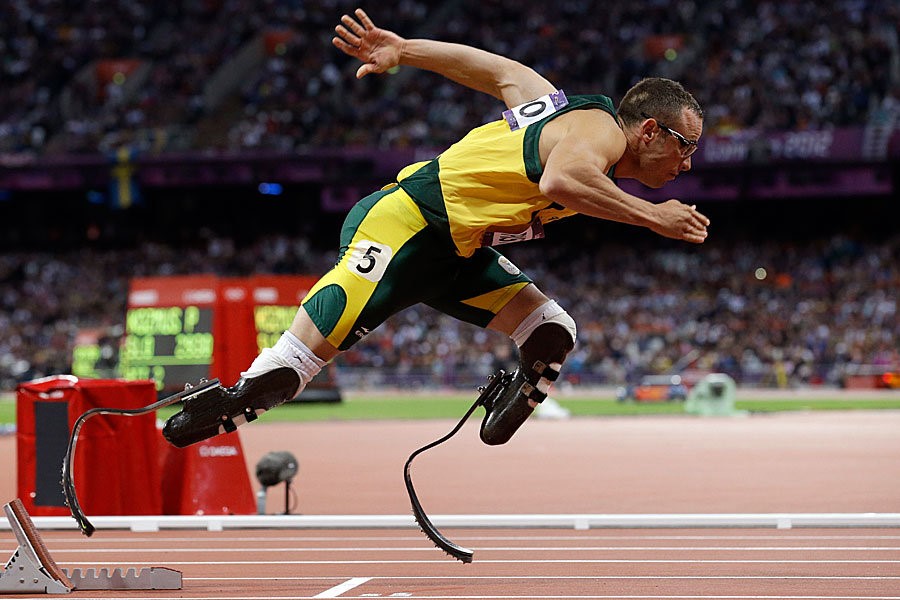 South African Court of Appeal Doubles Oscar Pistorius’ Prison Sentence
South African Court of Appeal Doubles Oscar Pistorius’ Prison Sentence
Recently, the Supreme Court of Appeal of South Africa increased Oscar Pistorius’ prison sentence to thirteen years and five months for the murder of his girlfriend, Reeva Steenkamp. Known to many as the “Blade Runner” for his carbon-fiber prosthetic legs, Pistorius captured the hearts and minds of millions for his inspired performance during the 2012 Olympics in London, England. While he failed to earn a medal in the 400-meter race, Pistorius’ presence on the track marked the first time in Olympics history that a double-amputee competed against able-bodied athletes.
Born with a congenital disorder affecting the development of his fibulas, Pistorius had both legs amputated below the knee when he was eleven months old. As a teenager, he learned to use prosthetic legs to overcome his physical disadvantages and eventually came to excel in athletics. His rise up the ranks as a sprint runner moved almost as fast as he did. Despite only participating in track for a few years, Pistorius captured the gold medal in the 200-meter race at the 2004 Paralympics in Athens, Greece. Following his victory in Athens, the so-called “fastest man on no legs” began to compete in races throughout South Africa against able-bodied athletes. The fact that he wore prosthetic legs, however, proved to be a source of controversy.
During each of his races, Pistorius wore a pair of Flex-Foot Cheetahs, a lightweight carbon-fiber foot. In 2007, the International Association of Athletic Foundations (IAAF) barred Pistorius from competing in international competitions against able-bodied athletes. The IAAF argued that Pistorius’ artificial limbs would give him an unfair advantage on the track. Pistorius immediately appealed the ruling and, the following year, the legal dispute was resolved in his favour as the Court of Arbitration for Sport overturned the IAAF’s decision. Pistorius proceeded to qualify and compete in the 2012 Olympics; however, it would not be long before he made headlines for a very different reason.
In 2013, Pistorius shot and killed Reeva Steenkamp at his home in Pretoria, South Africa. Steenkamp, a model and television personality, was shot four times by Pistorius in the middle of the night through the locked door of a bathroom. Pistorius claimed that the shooting was an accident after he mistook Steenkamp for an intruder. Despite living in a gated community, Pistorius kept a loaded gun in the house for protection. Prosecutors contended that the shooting of Steenkamp was a deliberate act stemming from a heated argument between her and the former Olympian. Text messages exchanged between the two in the weeks leading up to the murder were shown in court. These private conversations revealed a volatile relationship marred by accusations of jealousy and emotional abuse.
After months of legal proceedings, Pistorius was convicted of manslaughter and sentenced to five years in prison. A year later, however, the Supreme Court of Appeal overturned the conviction and upgraded it to the more severe charge of murder. The minimum sentence for murder in South Africa is fifteen years; however, judges reserve the right to lower the sentence if there are compelling reasons to do so. During the sentencing, the trial judge cited a number of mitigating factors that warranted a lesser punishment, including Pistorius’ supposed potential for rehabilitation. The trial judge went on to describe Pistorius as “a fallen hero” and an individual who “will never be at peace”. For the murder of Steenkamp, Pistorius was sentenced to six years in prison.
The six-year sentence was widely panned in the media. Many observers speculated that Pistorius received a slap on the wrist because of his status as one of South Africa’s most beloved public figures. Prosecutors responded immediately in appealing the decision. Justice Willie Seriti of the Supreme Court of Appeal found in favour of the prosecution, and held that the facts of the case demanded a higher sentence. Speaking on behalf of the five-judge panel, Justice Seriti stated: “The sentence of six years’ imprisonment is shockingly lenient to a point where it has the effect of trivializing this serious offence”. The Supreme Court of Appeal proceeded to increase Pistorius’ sentence to fifteen years minus one year and seven months for time served in prison and while under house arrest.
According to the Steenkamp family, the Supreme Court of Appeal’s decision in doubling Pistorius’ sentence is “justice for Reeva”. At this time, it remains to be seen whether Pistorius and his legal team will seek to appeal the sentence to the Constitutional Court of South Africa, the nation’s highest court. If one thing is for certain, however, it is that public interest in this case is not going to diminish any time soon.
